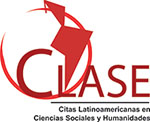Trastornos de la conducta alimentaria en población infantil durante la pandemia de COVID-19
DOI:
https://doi.org/10.23857/dc.v7i3.2060Palabras clave:
Pandemia, COVID- 19, población infantil, trastornos alimentarios.Resumen
La pandemia del coronavirus (COVID-19) ha afectado de míºltiples maneras a la humanidad. En el caso de la población infantil el aislamiento social impuesto ha podido afectar el estilo de vida y de esta manera profundizar los trastornos alimentarios en una población vulnerable. La presente investigación da a conocer aquellos estudios realizados en torno a los niños y los trastornos alimentarios provocados en torno a la pandemia. A través de una revisión bibliogrófica se determina la documentación relevante desarrollada por investigadores alrededor del mundo, quienes comparten sus guías y hallazgos estudiados a partir de diciembre de 2019. Como resultado se obtiene que algunos países a través de sus médicos, sanitarios y personal investigador de salud han desarrollado guías y procedimientos para tratar a esta población. Asimismo, se describen los factores y consecuencias que han incidido en los niños durante la pandemia.
Citas
Brown, S., Opitz, M. C., Peebles, A. I., Sharpe, H., Duffy, F., y Newman, E. (2021). A qualitative exploration of the impact of COVID-19 on individuals with eating disorders in the UK. Appetite, 156, 104977.
Couturier, J., Pellegrini, D., Miller, C., Bhatnagar, N., Boachie, A., Bourret, K., Brouwers, M., Coelho, J. S., Dimitropoulos, G., Findlay, S., Ford, C., Geller, J., Grewal, S., Gusella, J., Isserlin, L., Jericho, M., Johnson, N., Katzman, D. K., Kimber, M., . . . Webb, C. (2021). The COVID-19 pandemic and eating disorders in children, adolescents, and emerging adults: virtual care recommendations from the Canadian consensus panel during COVID-19 and beyond. Journal of Eating Disorders, 9(1). https://doi.org/10.1186/s40337-021-00394-9
Davis, C., Ng, K. C., Oh, J. Y., Baeg, A., Rajasegaran, K., y Chew, C. S. E. (2020). Caring for Children and Adolescents With Eating Disorders in the Current Coronavirus 19 Pandemic: A Singapore Perspective. Journal of Adolescent Health, 67(1), 131–134. https://doi.org/10.1016/j.jadohealth.2020.03.037
Department of Health and Social Care. (2020, 27 julio). New obesity strategy unveiled as country urged to lose weight to beat coronavirus (COVID-19) and protect the NHS. GOV.UK. https://www.gov.uk/government/news/new-obesity-strategy-unveiled-as-country-urged-to-lose-weight-to-beat-coronavirus-covid-19-and-protect-the-nhs
Dondi, A., Candela, E., Morigi, F., Lenzi, J., Pierantoni, L., y Lanari, M. (2020). Parents’ Perception of Food Insecurity and of Its Effects on Their Children in Italy Six Months after the COVID-19 Pandemic Outbreak. Nutrients, 13(1), 121. https://doi.org/10.3390/nu13010121
Fernándezâ€Aranda, F., Casas, M., Claes, L., Bryan, D. C., Favaro, A., Granero, R. .., y Treasure, J. (2020). COVIDâ€19 and implications for eating disorders. European Eating Disorders Review, 28(3), 239.
Flick, U. (2015). Introducing research methodology: A beginner's guide to doing a research project.
Haddad, C., Zakhour, M., Haddad, R., Al Hachach, M. S., y Salameh, P. (2020). Association between eating behavior and quarantine/confinement stressors during the coronavirus disease 2019 outbreak. Journal of eating disorders, 8(1), 1-12.
í˜rngreen, R., y Levinsen, K. (2017). Workshops as a Research Methodology. Electronic Journal of E-learning, 15(1), 70-81.
Rantala, M. J., Luoto, S., Krama, T., y Krams, I. (2019). Eating disorders: an evolutionary psychoneuroimmunological approach. Frontiers in psychology, 10, 2200.
Schlegl, S., Maier, J., Meule, A., y Voderholzer, U. (2020). Eating disorders in times of the COVIDâ€19 pandemic—Results from an online survey of patients with anorexia nervosa. International Journal of Eating Disorders, 53(11), 1791-1800.
Solmi, F., Downs, J. L., y Nicholls, D. E. (2021). COVID-19 and eating disorders in young people. The Lancet Child y Adolescent Health, 5(5), 316-318.
Spettigue, W., Obeid, N., Erbach, M., Feder, S., Finner, N., Harrison, M. E., y Norris, M. L. (2021). The impact of COVID-19 on adolescents with eating disorders: a cohort study. Journal of Eating Disorders, 9(1), 1-8.
Striegel-Moore, R. H., y Bulik, C. M. (2007). Risk factors for eating disorders. American psychologist, 62(3), 181.
Touyz, S., Lacey, H., y Hay, P. (2020). Eating disorders in the time of COVID-19.
Yaffa, S., Adi, E. L., Itai, P., Marit, J. M., Doron, G., y Daniel, S. (2021). Treatment of eating disorders in adolescents during the COVID-19 pandemic: a case series. Journal of Eating Disorders, 9(1), 1-11.
Publicado
Cómo citar
Número
Sección
Licencia
Authors retain copyright and guarantee the Journal the right to be the first publication of the work. These are covered by a Creative Commons (CC BY-NC-ND 4.0) license that allows others to share the work with an acknowledgment of the work authorship and the initial publication in this journal.






